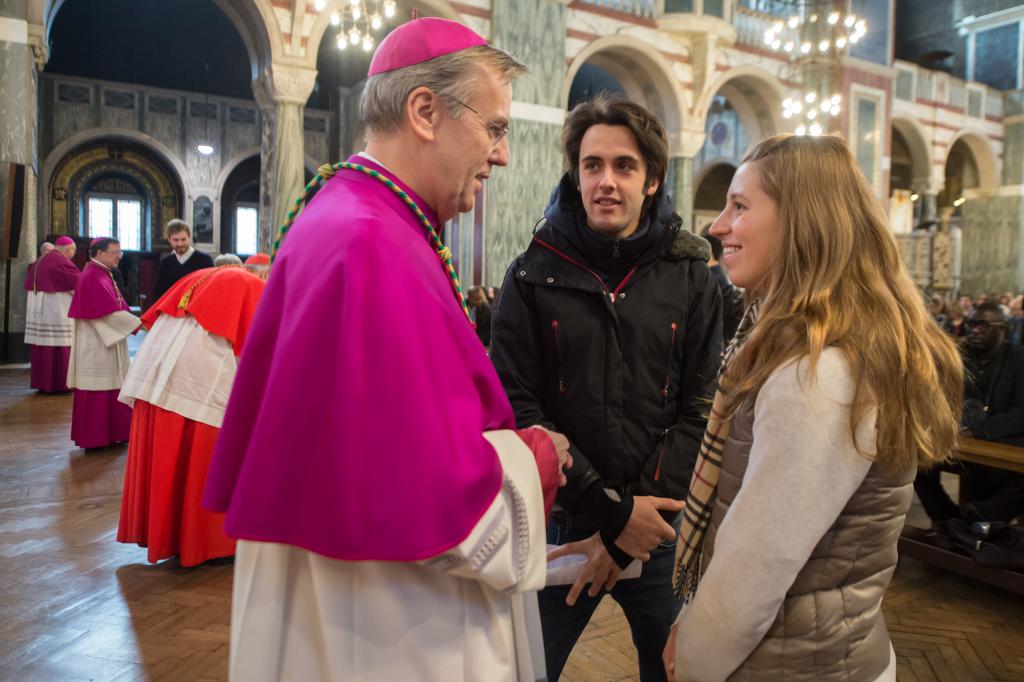This originally appeared in the March 2016 edition of the Westminster Record, written by Bishop Nicholas Hudson:
People often ask me what we mean by evangelisation.
I tell them it is about bringing others to Christ. This came home to me powerfully at the Rite of Election. Catechumens and candidates streamed forward to meet the Cardinal and the Auxiliary Bishops to be welcomed formally into the Church. They were made up of three distinct groups: catechumens who are going to be baptised at Easter, candidates who are already baptised but seeking now to become Catholic, and candidates who are already baptised Catholics but are now asking for Confirmation at Easter. None of them was alone. Each was accompanied by someone who had brought them.
I could not resist asking these catechumens and candidates what was leading them to become Catholics! And what struck me is that, almost to a man/woman, they said it was not a ‘what’ but a ‘who’. It was someone who had brought them, and s/he was standing right next to them as their sponsor. I told them we should not be at all surprised because that is how it happened in the Gospels too: people who had met Jesus and discovered him for who he was went and told their friends, ‘we have found the Messiah’ and urged their friends to come and meet him for themselves.
I say evangelisation is about bringing others to Christ. When we were preparing for Proclaim Westminster in different groups around the diocese, a number of parishioners asked what else we could say about evangelisation. They seemed to find it helpful when we suggested that evangelisation is, at heart, the communication of a relationship: the communication of a relationship with Christ, in word and deed and in such a way that leads people to ask, ‘Who is this Jesus whom you love and worship?’ It is about bringing others to Christ by bringing them the Gospel.
Lent is a time to reflect on how well we are doing this.
I think of Lent as a forty-day retreat when we ask ourselves how the Lord might be calling us to embrace that Gospel more deeply. For catechumens, it is called the period of Purification and Enlightenment. They are invited, with the help of beautiful liturgies called Scrutinies to scrutinise their lives in the light of the Gospel. One of the joys of celebrating the Scrutinies in the parish with catechumens is that we realise we are all of us, regardless of when we ‘found the Messiah’, called to do the same: to scrutinise our lives in the light of the Gospel.
Enlightenment, letting the light of the Gospel shine on our lives: this captures the heart of what Lent is about. For Lent is short for the word lengthening; Lent marks the lengthening of days as we approach the spring equinox and we enjoy the increase of sunlight. Lent is given to us to prepare our hearts to greet the Light, the true Light whom we welcome, risen out of the darkness, on Easter night.
This is a special Lent for us in the Diocese of Westminster because parishes are busy choosing evangelising initiatives for the next months and years. Proclaim Westminster was the beginning of a process whereby parishes were to ask themselves what more they might be called to do in the light of Pope Francis’s appeal, in Evangelii Gaudium, to each of us to become missionary disciples. In this Year of Mercy, the corporal and spiritual works of mercy give us a particularly rich measure against which to assess our evangelising activity. The Scriptures of Lent remind us it is not only as parishes but as individuals too that we need to scrutinise our lives in the light of these works of mercy.
Divine Mercy Sunday, the Octave day of Easter, coming as it does eight days after Easter, will see hopefully an outpouring of evangelising energy (in intent at least if not yet in fact) as every parish of the diocese announces three new evangelising initiatives. They will also announce which of their three initiatives they are going to be embarking upon first. The Rite of Election reminds us very forcibly that we must engage in these new initiatives all the new Catholics who were called to the Easter sacraments; and harness their new-found fervour to the all-important work of the Gospel. Since the time of Christ, it has often been those most recently converted who bring others to Christ: the evangelised rapidly become evangelisers!




